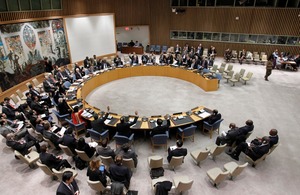'There can be no doubt that sadly terrorism continues to grow in Africa'
Statement by Ambassador Michael Tatham to the Security Council debate on peace and security in Africa: The challenges of the fight against terrorism in Africa – 13 May 2013

UN Security Council
Mr President,
I thank the Togolese Presidency, and in particular His Excellency the President of the Republic of Togo, for organising and chairing today’s debate on the challenges that terrorism poses to peace and security in Africa. I would also like to thank the Secretary-General and Director-General, Dr Abdullai Shehu for their briefings.
Mr President,
There can be no doubt that sadly, and worryingly, terrorism continues to grow in Africa. This reflects the evolution in the terrorist threat we face, which is ever more fragmented and geographically diverse. It threatens the countries and the people of Africa, as well as the citizens and interests of countries far beyond Africa’s borders. So the international community must work together with the countries of Africa to address this threat. This is a shared challenge for all of us.
Effectively tackling the threat from terrorism requires a comprehensive approach; making political, economic and humanitarian efforts as well as operational interventions. UN sanctions committees must play a crucial role in this. And it is important that all relevant components of the UN system work together to counter terrorist challenges, whilst avoiding duplication across its infrastructure. The UN’s counter-terrorism strategy and the Counter-Terrorism Implementation Task Force are key mechanisms for this end.
The international community should work collaboratively to reduce the drivers of terrorism, counter the radicalisation of the vulnerable and support inclusive governance structures which provide the people of Africa with both security and prosperity. It can be done. But it will require a tough, intelligent and patient approach.
Mr President,
Instability has long been a driver of terrorism. Al Qaeda, and other terrorist groups thrive where there is political instability and weak political institutions, and where there has been a failure to address long-standing political or social grievances. The international community must work collaboratively with African nations, taking a comprehensive approach to reduce poverty, developing effective governance and delivering economic progress to promote stability.
Alongside these efforts we should continue to seek to understand better what motivates individuals to engage in terrorism and counter these grievances; be they local, national, regional or international. Terrorism must not be allowed to become an attractive option for those disenfranchised with the status quo.
Mr President,
Ransom payments have contributed to the growth of terrorism in Africa. Kidnap for ransom both supports terrorism and is a form of terrorism itself. The international community must take collective action to combat this problem. We endorse the Global Counterterrorism Forum’s (GCTF) Algiers Memorandum, which provides practical suggestions on how to prevent and resolve terrorist kidnaps, and we welcome the recent experts’ meeting in Bogota. We fully support the work of the Financial Action Task Force to improve anti-money laundering and terrorist financing frameworks worldwide.
Furthermore, we must work together to ensure that the scale of the current threat from terrorism does not grow. As the United Kingdom’s Prime Minister noted on 21 January, I quote, “Four years ago, the principal threat from Islamist extremism came from the Afghanistan and Pakistan region. A huge amount has been done to address and reduce the scale of that threat. Whereas at one point three quarters of the most serious terrorist plots against the UK had links to that region, today that has reduced to less than half, but at the same time al-Qaeda franchises have grown in Yemen, Somalia and parts of North Africa.” End of the quote.
Mr President,
As the Foreign Minister of Luxembourg noted, Somalia is an important point. Just last week, the United Kingdom hosted the Somalia Conference, attended by representatives from fifty-four countries. It is clear that fighting terrorism alone cannot – on its own – address the root causes of the problems Somalia faces. The scale of the challenge means that we must engage all the tools at our disposal: diplomatic networks, aid and trade, our political relations, and security co-operation. We must also support the building blocks of democracy, such as the rule of law. There is no room for complacency in Somalia. Al-Shabaab remains a deadly threat. However, we believe that the gradual progress being made in Somalia offers a frame of reference. It is an approach the international community can draw on elsewhere to patiently help rebuild fragile states and address the drivers of terrorism.
Mr President,
As the Secretary-General said in his opening remarks, and as many speakers have echoed, the struggle against terrorism must go forward on many fronts and in a multi-dimensional way. We must tackle terrorism in a variety of ways. Militarily of course, but we must also address the narrative that terrorists feed on, we must close down the ungoverned spaces in which they thrive and we must deal with the grievances they use to garner support.
The United Kingdom is committed to working with partners to defeat terrorism. We will use our chairmanship of the G8 to ensure that these issues remain at the very top of the international agenda.
Thank you Mr President.